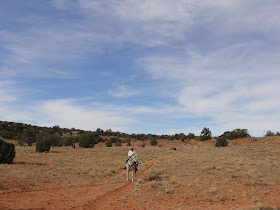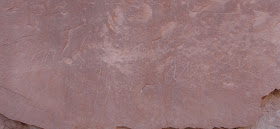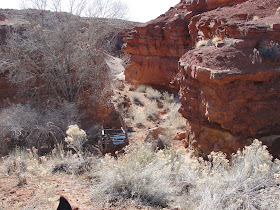We recently complete a 50 mile endurance competition starting at Mt. Carmel Junction and traversing the countryside surrounding Zion National Park. The above photo is taken at Mineral Point, above a branch of the Virgin River.
Also in April, we traveled to canyon country just outside of Bryce National Park, riding trails through Casto and Losee Canyons. The reddish hoodoos are typical of the area's famous Claron formation.
Note the tiny window in the red rock fin.
This streambed showed an abundance of small pockets created by erosion. We found running water in one canyon, enough to provide a cool drink for the horses and a swimming hole for Daisy.
In front and to the left of Steve is a Great Basin bristlecone pine, Pinus longaeva. At this latitude, we see them at 8000 feet or above, in high, windy, dry locations subject to cold winters, where they are best able to compete. Bristlecones grow very slowly and some are estimated to be thousands of years old. The needles can stay on the trees for up to 40 years. The thickly needled branches resemble bottle brushes. The tree seems to prefer the dolomitic white colored soil shown above. Limber pine and Ponderosa pine also grow in the higher areas.
The views were impressive.
The weather was 60ish and sunny, with just enough wind to keep the horses cool. We couldn't have ordered up a better day to explore these colorful, unique canyons.
Pages
▼
April 30, 2017
April 19, 2017
Goat Park
On our third day in the San Rafael Desert, Daisy was tired from the previous days. She didn't protest when we left her at the trailer.
We rode on an old two-track down Goat Park. Above, Steve checks his GPS.
Boss's ears pricked up as he saw something moving maybe a quarter of a mile ahead. That alerted me to this group of donkeys. We rode very close to them before they ran away.
We rode along the rim of Blue John Canyon, checking for water where we had seen small pools before. Surprisingly, in spite of a rainy spring, we didn't find water in the usual places. We rode to the Red Nubs before turning back.
Daisy, of course, was glad to see us return. Boss and Coco took us 50 miles in 3 days, a good workout for all.
We rode on an old two-track down Goat Park. Above, Steve checks his GPS.
Boss's ears pricked up as he saw something moving maybe a quarter of a mile ahead. That alerted me to this group of donkeys. We rode very close to them before they ran away.
We rode along the rim of Blue John Canyon, checking for water where we had seen small pools before. Surprisingly, in spite of a rainy spring, we didn't find water in the usual places. We rode to the Red Nubs before turning back.
Daisy, of course, was glad to see us return. Boss and Coco took us 50 miles in 3 days, a good workout for all.
Head Spur
Daisy enjoyed a dip in a pool.
Steve pointed out the Princess pictograph, which is faint now, faded by with sun and weather.
Behind some brush, a pour-off marks the entry of Moqui Canyon into the Spur Fork.
These small pictographs, only a couple of inches tall, have amazing detail. The 4 figures on the right wear elaborate headdress. They seem to be under some kind of tent or overhang. On the right, we see 3 figures, a bird and a couple of insects? It's always interesting to try to interpret ancient drawings.
On a rock wall near the Head Spur, we saw this rock art. Someone in 1924 made his/her mark.
We rode back to the trailer at a trot, covering some rough country.
Shifting Sands
In early March, we squeezed in another trip to the San Rafael Desert.
It's lonesome territory out there. No wonder train robbers and other outlaws hung out there a century ago.
We rode toward the Chimney Rocks,
and down to Outlaw Springs. The tip of Boss's ear appears in the photo. Taking pictures off a horse's back doesn't provide the best quality.
The word is that the water is quite alkaline. Our horses didn't drink much. Daisy didn't mind swimming in it, though.
We explored some rock outcroppings, and found a few petroglyphs.
Underneath the hand prints, you might be able to see the shape of 2 horses and riders pecked into the rock. This rock art isn't very old. It might be the work of outlaws or cowboys.
It's lonesome territory out there. No wonder train robbers and other outlaws hung out there a century ago.
We rode toward the Chimney Rocks,
and down to Outlaw Springs. The tip of Boss's ear appears in the photo. Taking pictures off a horse's back doesn't provide the best quality.
The word is that the water is quite alkaline. Our horses didn't drink much. Daisy didn't mind swimming in it, though.
We explored some rock outcroppings, and found a few petroglyphs.
Underneath the hand prints, you might be able to see the shape of 2 horses and riders pecked into the rock. This rock art isn't very old. It might be the work of outlaws or cowboys.
























